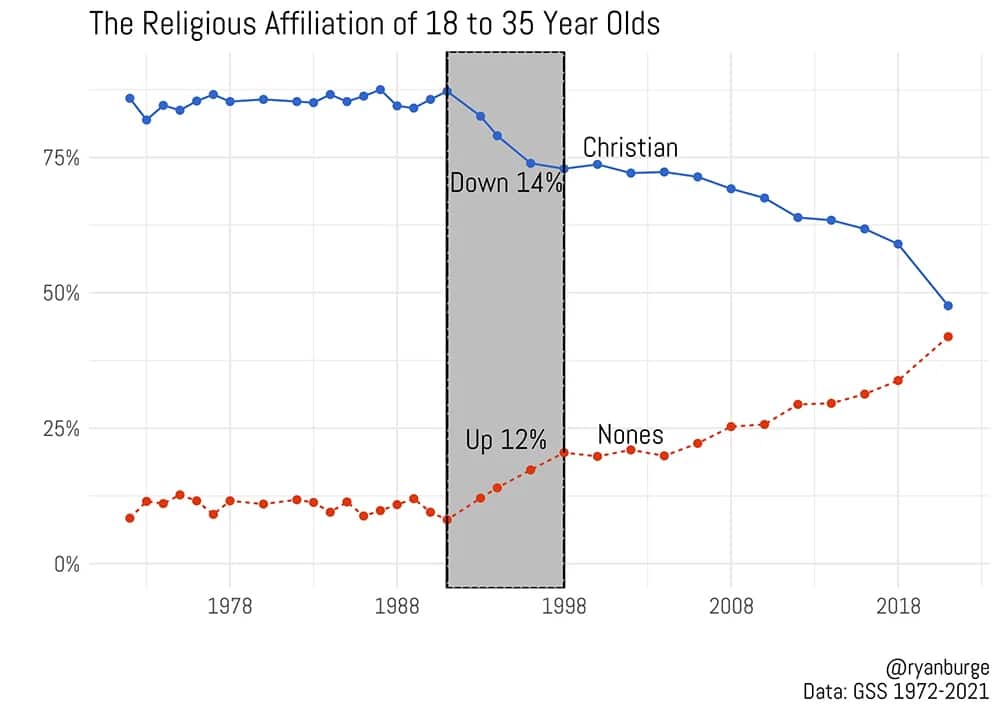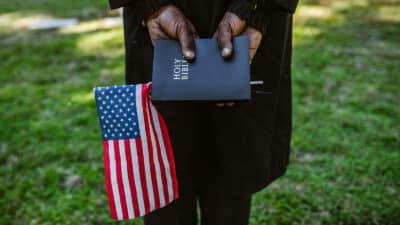Possibly the most oft-repeated statistic in American religion is the rise of the religiously unaffiliated from just 5% of the population in the early 1970s to about 30% of adults in 2022. In a field where shifts typically move at a glacial pace, that demographic factoid may represent the most abrupt and most consequential shift in American society in the postwar period.
But there is a more recent such phase shift, when American religion changed incredibly quickly, in whose aftermath we feel even today.
Using data from the General Social Survey, which has been fielded consistently from 1972 through 2021, and restricting the sample to adults between the ages of 18 and 35, a single decade comes into sharp focus: the 1990s. It’s a moment when young Americans seemed to lose religion virtually overnight.
In 1991, 87% of young adults indicated that their faith was Christian, primarily Catholic and Protestant. Just 8% of this age group said that they had no religious affiliation.
In 1998, only seven years later, the share of 18- to 35-year-olds who said they were Christians dropped a full 14 percentage points to 73%, while the percentage who answered “none” jumped to 20%, an increase of 12 percentage points. A ratio that hadn’t changed at all between 1972 and 1991 had moved by double digit percentages in seven years.
Your tax-deductible gift helps our journalists report the truth and hold Christian leaders and organizations accountable. Give a gift of $30 or more to The Roys Report this month, and you will receive a copy of “Hurt and Healed by the Church” by Ryan George. To donate, click here.
What caused this change to occur at this specific point in American history? It’s hard to pinpoint just one thing, but there are possible culprits.

The end of the Soviet Union: On Christmas Day 1991, Mikhail Gorbachev resigned as president of the Soviet Union and Boris Yeltsin took power over Russia.
Described by historian Kevin Kruse and others as a conflict between the virtuous Christian capitalists of the United States and the godless communists of the Soviet Union, the Cold War was a time when “In God We Trust” first appeared on American currency and “Under God” was added to the Pledge of Allegiance.
By the mid-1990s, being nonreligious no longer meant being un-American, giving permission for a lot of closet nones to begin expressing their true feelings on surveys.
Backlash against the religious right: As I describe in my book “The Nones,” evangelical Christians made up about 17% of the U.S. population in 1972; in 1993, that had rised to 30%. As Ruth Braunstein argued in The Guardian earlier this year, “backlash against a radical form of religious expression leads people to distance themselves from all religion, including more moderate religious groups that are viewed as guilty by association with radicals.”
When faced with the strident rhetoric of the Revs. Jerry Falwell, Pat Robertson and the rest of the religious right leaders, many moderates headed for the church exits and never came back.
Political polarization: In his excellent 2018 book, “The Red and the Blue: The 1990s and the Birth of Political Tribalism,” Steve Kornacki makes the point that in 1994 Newt Gingrich led a Republican takeover of the House by refusing to compromise with those on the other side of the aisle. Gingrich’s bomb-throwing approach appealed to conservative Christians by painting Democrats as morally inferior and godless. Many young Americans chose godlessness.
The internet: Demographers ignore the impact of the World Wide Web at their peril. It would make sense that as young people were exposed to other faiths on the new technology — and saw the faults in their own — some would leave faith behind altogether. But the data doesn’t entirely support it. According to the Census Bureau, just 20% of American households had internet access in 1997. While many young Americans had access to the web in school before they had a home connection, the effect was likely only to accelerate the trends cited above.
The echo of this falloff is what we are living with today. Many of those who fled from religion in large numbers during this period also chose to raise their children without religion. Today nearly half of those children — millennials and Gen Zers — say that they have no religious affiliation.
The views expressed in this commentary, which was originally published at Religion News Service, do not necessarily reflect those of The Roys Report.
 Ryan Burge is an assistant professor of political science at Eastern Illinois University, a pastor in the American Baptist Church and author of “The Nones: Where They Came From, Who They Are, and Where They Are Going.”
Ryan Burge is an assistant professor of political science at Eastern Illinois University, a pastor in the American Baptist Church and author of “The Nones: Where They Came From, Who They Are, and Where They Are Going.”




















26 Responses
Thank you for your opinion. Although the Roys Report claims no connection, I haven’t seen it print opposing views.
There might be a few things you overlooked- the influence of a president with religious ties involved in a sexual affair, the media and its portrayal of the religious right, the abortion issue, alternative lifestyles, liberalism that denigrated the veracity of Scripture, and the complacency that comes without struggle.
I honestly never considered anyone might have left evangelical Christianity because of Bill Clinton (and definitely never met anyone who claimed to have).
I know of Christians who rethought evangelical Christianity not because of Bill Clinton, but because of the hypocritical witch hunt led by Newt Gingrich, who was self-righteously quoting scripture while having an affair of his own.
Also, watching the same Christians who wanted Clinton impeached for his affair because “the character of the POTUS matters” suddenly claiming that “it’s a private matter” or “we didn’t elect a pastor” when Trump was in the hot seat for his misconduct, sexual harrassment, bullying, and profane language, sealed the departure of many I know.
Interesting that post 2018 there is a similar shift in the demographics. This was also a time of strong and uncompromising presence of the religious right. That would seem to corroborate the analysis that the backlash against the religious right and political polarization are causes of the shift.
Evangelical dogma on Biblical “inerrency” also did not help with college-educated youth into dinosaurs. (Inerrency” advanced with the conservative SBC 1971-3 takeover.) SBC’s passive acceptance of segregation–until Richard Viguerie told it to condemn abortion instead–did not help.
Anti-abortion politics did not appeal to many Catholics on the Pill. Some Catholics resented being called non-Christians and believed that the Pope’s insistence on abortion as the only issue was to distract from clerical abuse. (Many fertilized eggs do not implant and abortion pills do not seem like murder.)
And of course, Trump & Falwell Jr., Inc. January 6, 2021 was not a good day for institutional Conservative Christianity.
Postscript, younger people are not necessarily less-religious, but repeated scandals have made them less-affiliated.
I tell people jokingly, that my (Congregational) Church is for people who dislike :organized religion”.
If you sift through the many pages of data from the various Pew Research surveys over the last 20 years, it’s pretty obvious that younger people are much less religious these days. The number of atheists and agnostics is still only around 10%, so it is true that a very large majority of the non-religious still consider themselves to be believers in some form or another, but they’re not Christians in the sense that they’re orthodox (small ‘o’) believers who choose not to attend church. For example, you won’t find many who believe that you must confess your sins and give your life to Jesus to gain the Kingdom of Heaven.
Beliefs among the ‘nones’ is much more unfocused and vague. They typically believe in a higher power — someone or something who is “in control” — and many still believe in the power of prayer, but it’s more a generalized spiritualism, often with influences from other religious traditions mixed in. And, above all, they lead lives that are almost indistinguishable from those who have little to no belief at all.
“Gingrich’s bomb-throwing approach appealed to conservative Christians by painting Democrats as morally inferior and godless”
THIS. As a moderate Democrat and Bible-believing Christian, I have grown weary of defending myself against condescending labels, assumptions, and “if you were a REAL Christian, you’d vote like us!” arguments leveled at me in church – both from the pews AND the pulpit. I’ve been treated with more disdain by fellow believers than by those who do not affiliate with any religion or who are athiests. So guess who it’s more tempting to spend time with?
Interesting article, and I think it mostly hits the mark. The culture wars and the politicization of the faith have driven a lot of people away from evangelicalism, and not just the younger generation. I think the numbers will bear that out.
But not all who left have lost faith, myself included. Don’t forget that 80% of white evangelicals supported Trump. That didn’t happen overnight; it was the result of a long trajectory in that direction. And for those of us who didn’t support that individual, it was difficult to watch and even more difficult to try to reconcile with our understanding of how one’s faith should inform one’s participation in the public square. Even many outside the faith entirely were left scratching their heads about how following Jesus and support of an individual like Trump could possibly be aligned.
I don’t think the culture wars and all that have helped the church’s witness. Christianity has rarely done well when it aligns itself strongly with political and social power structures.
What choice did people have? Not vote or support Hillary Clinton and the Dems’ radical platform?
That’s a culture war response.
Just because religious and political big shots tell us absolutely anybody is better than a Democrat does not mean we have to believe them.
It’s okay to admit we were wrong. I was definitely wrong about Trump at various times over the last six years.
Here’s a thought – put forth another candidate. There were 11 to choose from in the Republican primary. There’s still time to find a good candidate before 2024, but conservatives are still stuck on Trump as if he’s the only option.
Conservative Christians need to stop blaming and asking helpless, victim-minded questions like “what choice did I have?” and take responsibility for who you collectively elected from that primary, and who you continue to obsess over.
Isn’t personal accountability something conservatives claim to stand for?
Donna, do you believe in God? Because if you do, then you didn’t have to vote for either Clinton or Trump, in full confidence that God is in control, and sets up and removes kings as he pleases. Your arguments sounds rather like Sarah having Hagar give birth on her knees and then claiming Ishmael as the child of promise — you’re just trying to help God out rather than wait for him to act in his own good time.
Suppose ancient Israel had had elections, and the two candidates were Ahab and Athaliah. Which of them do you suppose Elijah would have supported? Most likely neither. He would have roundly condemned both of them and trusted God for the outcome.
What happened in 2016 was BOTH major parties ended up nominating their WORST possible candidate.
Any Republican but Trump would have beaten Hillary in a landslide.
And Democrat but Hillary would have beaten Trump in a landslide.
Result?
By November the choice was between Cersei Lannister and Benito Mussolini.
The oft-quoted statistic that 80% of US evangelicals voted for Trump in 2016 has been proven to be misleading. Asked during exit polls “Are you an evangelical?,” many Trump voters who answered “yes” could not define the word “evangelical,” did not attend church regularly, and did not believe the most basic of doctrines. In other words, the 81% were self-described evangelicals but likely not Christians by any definition. Here’s one helpful analysis:
https://www.christianitytoday.com/ct/2018/october/why-evangelicals-trump-vote-81-percent-2016-election.html
I agree with other posters that politics does not advance the cause of Christ.
Thank you, Cec. This doesn’t surprise me given there are a lot of “buzz words” thrown around that people cannot clearly define, and therefore are horribly misunderstood and/or misused. Other examples include: elite, woke, Marxist, Communist, liberal, conservative, CRT, racist, and social justice.
The numbers are merely numbers, and quite ambiguous in terms of motivation for the changes. Everyone can cast their vote for their preferred meaning to deprecate opinions they don’t like. So far it’s driven by conjecture. (An opinion or conclusion formed on the basis of incomplete information) There are many reasons. Coming to bear with which reasons are most predominant is guessing at this point. How helpful is that?
Professor Ryan Burge is to be applauded for not only asking the question, but also presenting thoughtful theories from Ruth Braunstein and Steve Kormacki.
It’s interesting to note the concerns addressed by a mid-westerner, removed from the frantic pace of either coast. Professor Burge hails from portions of the country that represented the very core of post war allegiance and commitment to religious institutions. Indiana, a stone’s throw from eastern Illinois, arguably the nation’s remnant and vestige of middle class, Protestant or Catholic culture. Want to find a variety of private colleges for a son or daughter? Indiana has led the way for decades, to include Notre Dame. Some states, such as Wyoming, have no colleges associated with faith.
So what happened? I am 65 years of age and have a very rich experience of faith based schooling. Raised in the 60’s and 70’s in a vibrant Presbyterian church culture in Los Angeles, I attended Lutheran schools from 7th-12th grade. I then attended Anderson University in Indiana.
My experiences vast as they were, spiraled into loneliness in the 1990’s, as I could no longer see love or fellowship in the many many churches, where I desperately sought connection. Pastors like John MacArthur taught little of free grace, and a whole lot of legalism. The youth tuned out, and so did I. People that have sin in their life, deeply resent scolds preaching rejection, unless you are sanctified. We have other places to turn for acceptance.
R.E.M.’s hit song “losing my religion” was released in 1991. Maybe Jimmy Swaggert was right about that rock n roll music.
It’s too bad when people who have a strained relationship with God go about depending on other fallen human beings, including those in the ministry for guidance and support. Long ago the human race essentially denied God his rightful place and in today’s society, yes even so-called evangelicals appear not to be surrendered to Him but expect Him to accept their halfhearted commitment as being the best they can do. I’m not so certain that the problem doesn’t lie with the philosophers (in the pulpit) who might quote a verse of scripture then spend half an hour
pontificating their opinions, opinions that the Holy Spirit can’t embrace or support. If someone (in the pew) really felt convicted that they were a sinner and turned to God in prayer, He would answer them and then the relationship would grow from there. The younger generation has been robbed of strong Biblical teaching leaving them with no more than religious and moral platitudes.
Amen! Since when does belief in Jesus equate any political view? That is the “Noble Lie”, not faith in a very real Jesus, for salvation from the very real judgment of God for our sin. Decades of religious politicians, giving arguments from utility, about the supposed benefits of a Christian nation, subtly imply unbelief in the reality of God, not real faith in Jesus. The salvation Jesus won us by bearing our sin on the cross, was always subtly denied in Religious Right’s “don’t be so heavenly minded you’re no earthly good”. Decades of that being the only public expression of supposed Christianity, other than the fakery of televangelism, has done serious harm to the faith of generations. But we, as a people, think that any gods that be, ought to be conveniently served up to us through some form of media. We accept being brainwashed by the constant stimulation of media, and think there’s no “content”in going outside the camp to find the living God.
John 12: 32, It seems to me evangelicals stopped lifting up Christ. Making money and political power became the main objective.
Having grown up in the first majority unchurched generation in the UK, way back in the 1970s, my own take is that there is no specific cause of the trend away from Christianity among the young people in the United States. Pretty much all of the entire western Christendom has seen a massive fall off in religious faith over the last 50 years, and it happened in the UK long before Soviet Union fell and the Internet became a thing, and religion in politics has never been remotely as controversial in the UK as it has been in the US.
Can’t the truth be as simple as a general trend towards a more secular society where church is no longer the only game in town when it comes to being the source of community, education, entertainment, and assistance in times of need. Churches are not immune to the forces of capitalism, and Sunday mornings are no longer considered out of bounds by corporations and organizations who are furiously competing for the attention of America’s youth especially.
I have been in the US for 25 years, so I understand the tendency of many Americans to ignore what is happening in the rest of the world when looking for answers to things happening at home, but other than the fact that the US is one of the most conservative nations in the free world, and is thus more resistant to change than most, all I see is that America’s youth are later to the party than the youth in other nations. In some ways, it’s a surprise it’s taken so long.
Mike Walker,
Thanks for your insights and contributions on this subject.
I think your comment on community was an important one. I find it interesting that US military veterans’ organizations also peaked in membership in 1992, and the decline in fraternal organizations in the US over the past 30 years is as deep or deeper than the decline in Christian faith.
Bottom line: Those from Gen X through today’s millennials believe in community, but it’s different from one where church and other long-established organizations play a major role..
“And we know that for those who love God all things work together for good, for those who are called according to his purpose. For those whom he foreknew he also predestined to be conformed to the image of his Son, in order that he might be the firstborn among many brothers. And those whom he predestined he also called, and those whom he called he also justified, and those whom he justified he also glorified.”
If there are fewer Christians, there are fewer that have been called.
Why are we only citing and thinking about cultural and political causes when it is God that calls and God that saves us when we are spiritually blind, enemies of God?
Thanks for sharing this great youth ministry article! This is an excellent takeaway for church members and I can use it to improve my youth Sunday School lessons in the future. This serves as a great, God-focused reminder of our goals.